/topics/equity
Equity
Women at the center of climate friendly approaches to agriculture and water use - A report by the Institute for Agriculture and Trade Policy
Posted on 17 Jun, 2011 10:45 AM The Institute for Agriculture and Trade Policy draws on the experiences of the Tamilnadu Women’s Collective (WC), a state-level federation of women’s groups from 1,500 villages, in the context where communities all around the world are struggling to find ways to cope with changes affecting food and water security because of the phenomenon of climate change.
The report argues that many a times, new food and water security policies at the national and international level tend to be narrow, look at each of these issues in isolation and undermine food and water security strategies adopted by individuals and households from marginal groups. Adaptation strategies to address food security focus almost exclusively on increasing agricultural production, while ignoring health and cultural aspects of the food being produced, and the role of agriculture as a means for rural viability.
"Every 30 Minutes": Crushed by debt and neoliberal reforms, Indian farmers commit suicide at a staggering rate - A report by CHR&GJ - NYU School of Law - Interview with Democracy Now
Posted on 14 Jun, 2011 05:46 PMThe crisis has ballooned with economic liberalization that has removed agricultural subsidies and opened Indian agriculture to the global market. Small farmers are often trapped in a cycle of insurmountable debt, leading many to take their lives out of sheer desperation.
"NREGA implementation in State not satisfactory": MGNREGS News updates compiled by FES (16 - 30 April 2011)
Posted on 27 May, 2011 12:11 PM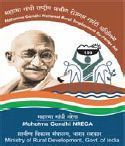
Main highlights in this update:
- NREGA implementation in State not satisfactory: The report card on implementation of Mahatma Gandhi National Rural Guarantee Act (MGNREGA) is a mix bag for Assam, with at least 62 per cent households being provided employment under the flagship schemes, while ombudsman has not been constituted for any district and State fund.
Khadkipada, Maharashtra - A tale of development, an account of transformation - A film by WOTR on the Water Channel
Posted on 26 May, 2011 01:42 PM
Planning for vulnerability - The hazards and setbacks in coastal legislation – A report by Dakshin Foundation
Posted on 22 May, 2011 06:16 PM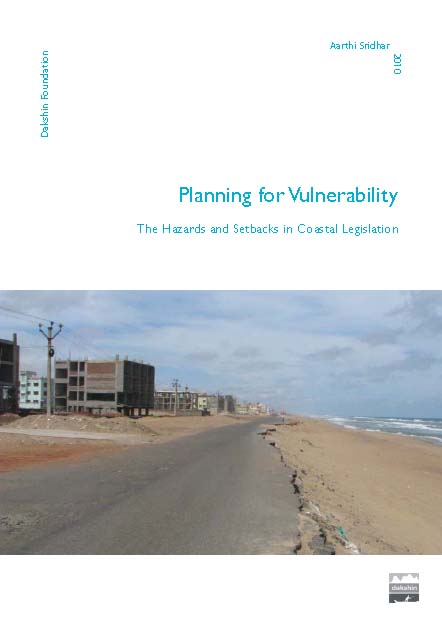 The law pertaining to coastal spaces – the Coastal Regulation Zone (CRZ) Notification, 1991 specifically decides what people can and cannot do on the coastal stretches of the country.
The law pertaining to coastal spaces – the Coastal Regulation Zone (CRZ) Notification, 1991 specifically decides what people can and cannot do on the coastal stretches of the country.
Monitoring system for incentive programs – Learning from large-scale rural sanitation initiatives in India – A report by the Water and Sanitation Programme
Posted on 21 May, 2011 02:15 PM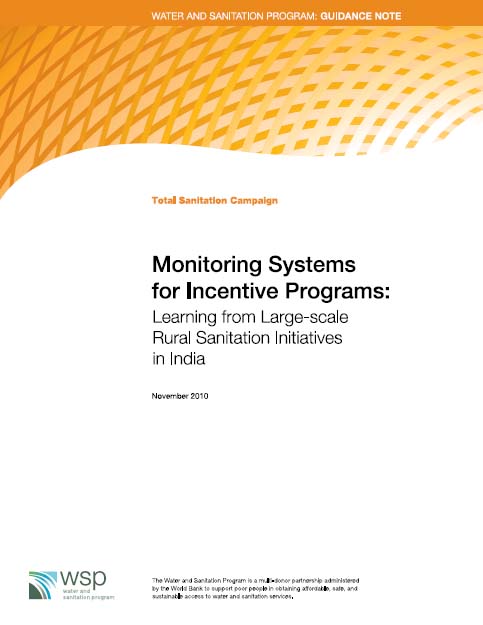 It is a part of the Global Scaling Up Rural Sanitation project of the Water and Sanitation Programme, World Bank and focuses on learning how to combine the approaches of Community Led Total Sanitation (CLTS), behavior change communications, and social marketing of sanitation to generate sanitation demand and strengthen the supply of sanitation products and services at scale, leading to improved health for people in rural areas. This is one in a series of knowledge products designed to showcase project findings, assessments and lessons learned in the project.
It is a part of the Global Scaling Up Rural Sanitation project of the Water and Sanitation Programme, World Bank and focuses on learning how to combine the approaches of Community Led Total Sanitation (CLTS), behavior change communications, and social marketing of sanitation to generate sanitation demand and strengthen the supply of sanitation products and services at scale, leading to improved health for people in rural areas. This is one in a series of knowledge products designed to showcase project findings, assessments and lessons learned in the project.
Over the last few years, the concept of open-defecation free communities has emerged as one of the building blocks toward achieving total sanitation. The term ‘access’ is widely used to capture increase in sanitation usage. However, a clean environment is a public good. Hence, there was a need to achieve total sanitation at the community level to realize public health benefits. This has led policy makers and practitioners to adopt strategies that achieve community-wide total sanitation status, which includes the community becoming open-defecation free, and adopting safe hygiene and environmental sanitation practices.
Groundwater scenario in major cities of India – A report by Central Ground Water Board
Posted on 17 May, 2011 10:35 AM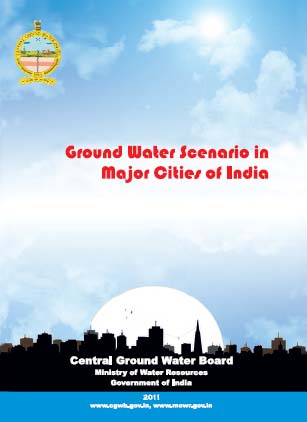 It covers varying groundwater scenarios in the country including the highly developed metros, the hilly region, the coastal cities, the cities tapping unconsolidated and hard rock aquifers. The report briefly describes the administrative set up, status of water supply and demand, groundwater scenario, feasibility of rainwater harvesting and groundwater development strategy.
It covers varying groundwater scenarios in the country including the highly developed metros, the hilly region, the coastal cities, the cities tapping unconsolidated and hard rock aquifers. The report briefly describes the administrative set up, status of water supply and demand, groundwater scenario, feasibility of rainwater harvesting and groundwater development strategy.
It is an updated version of an earlier report on “Groundwater in urban environment in India” (2000). Since then, groundwater regime, urban demography and water demand have changed enormously. This report will form a scientific base for an in-depth understanding of urban groundwater system including aquifer geometry, water level behavior and groundwater quality. The possibility of artificial recharge to rejuvenate the urban aquifers has also been discussed.
NREGA and rural water management in India: Improving the welfare effects – An occasional paper by IRAP
Posted on 09 May, 2011 09:41 PMNREGA is being eulogized by many in the academic, development and policy arena as a “silver bullet” for eradicating rural poverty and unemployment, by way of generating demand for productive labour force in villages and private incentives for management of common property resources.
Eradication of inhuman practice of manual scavenging and comprehensive rehabilitation of manual scavengers in India – A report by Rashtriya Garima Abhiyan
Posted on 21 Apr, 2011 09:15 PM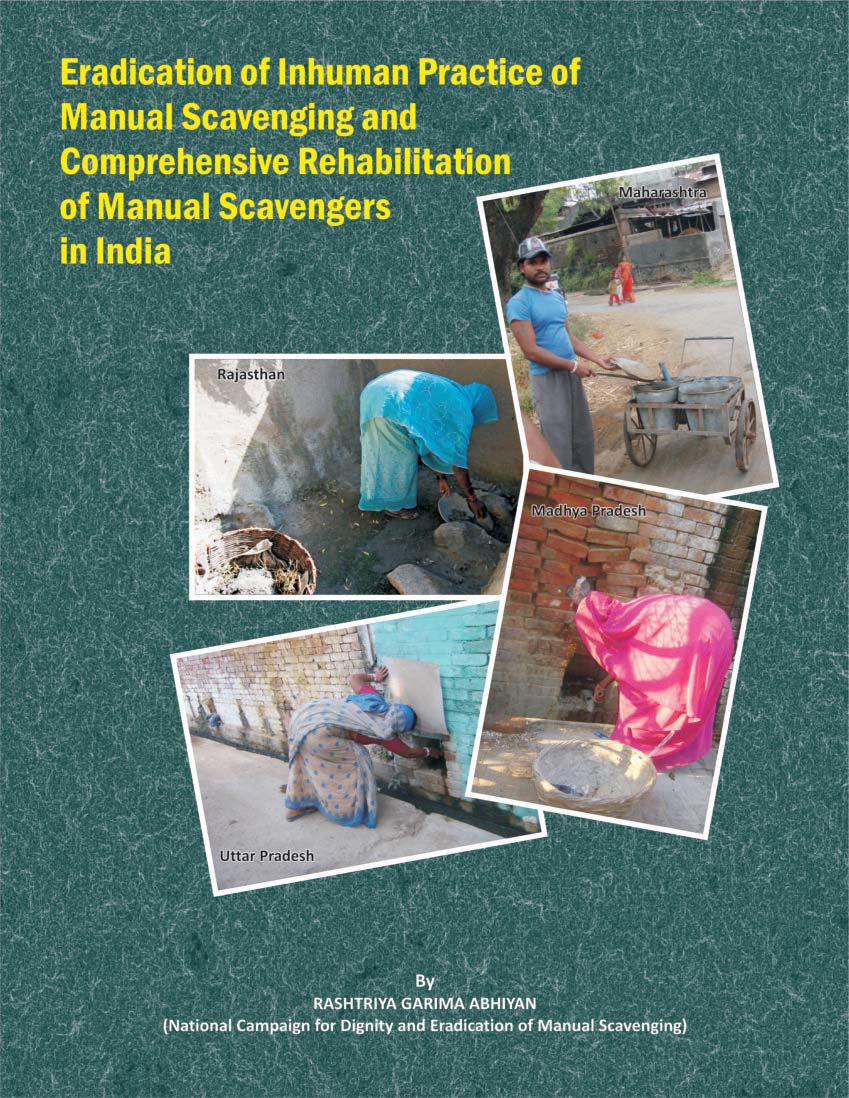 The practice continues in the country in spite of efforts of several people, implementation of government schemes such as the National Scheme for Liberation and Rehabilitation of Scavengers since 1992 and Self Employment Scheme
The practice continues in the country in spite of efforts of several people, implementation of government schemes such as the National Scheme for Liberation and Rehabilitation of Scavengers since 1992 and Self Employment Scheme
The effects of agricultural water and landholdings to rural livelihoods in Indo-Gangetic basin – Research analysis by IWMI and ICAR with an emphasis on Bihar
Posted on 18 Apr, 2011 11:56 PM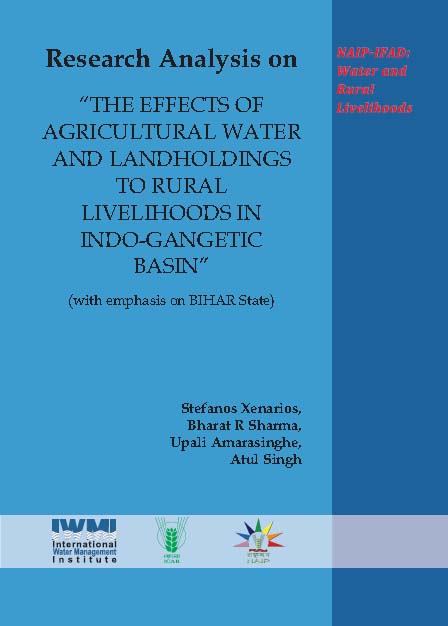 The current research analysis by International Water Management Institute (IWMI) in cooperation with ICAR Resear
The current research analysis by International Water Management Institute (IWMI) in cooperation with ICAR Resear




